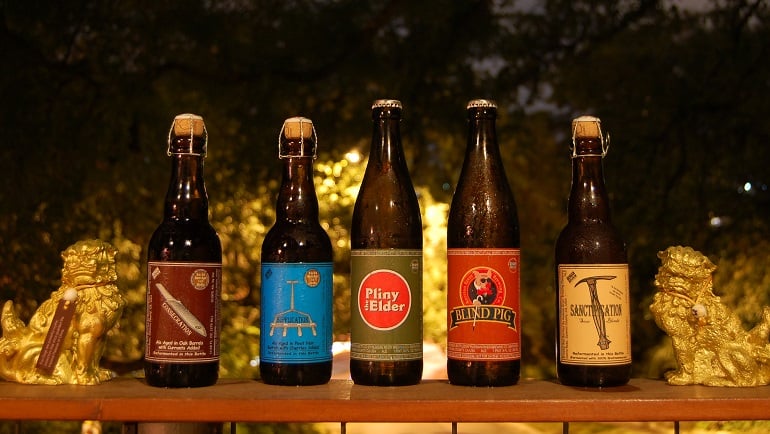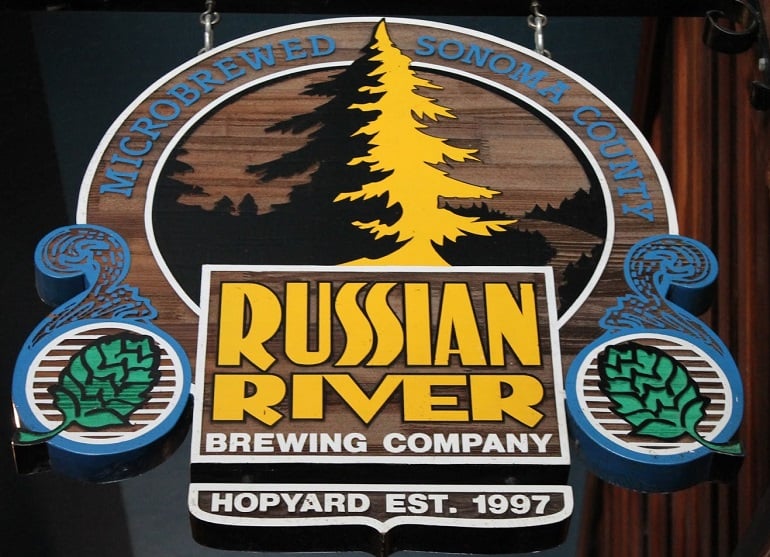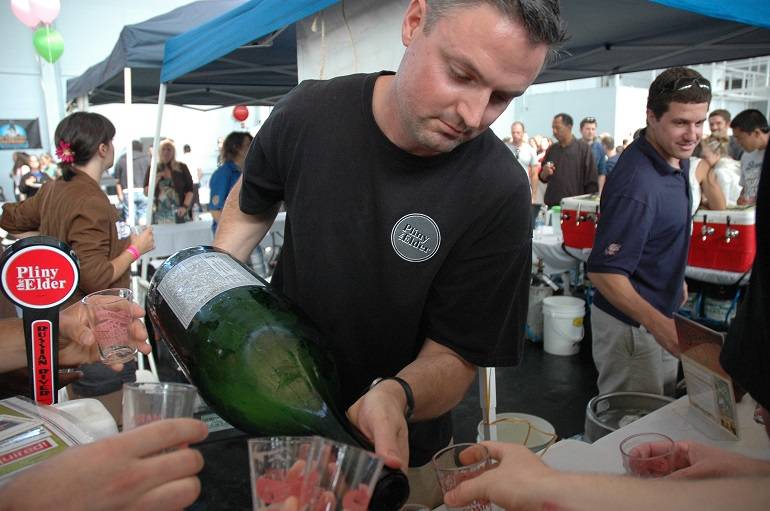Start 14-Day Trial Subscription
*No credit card required

Vinnie Cilurzo of Russian River Brewing
For Vinnie Cilurzo, pushing the envelope is an everyday affair. Widely regarded as the inventor of the Double IPA, the forward-thinking owner and brewmaster at Russian River Brewing Company unleashed this ferocious beer style on the imbibing public in the mid-90’s. Most would have stopped there, but for Cilurzo, introducing the world to the tongue-buckling intensity of over-the-top hops was just the beginning.
In the decade and a half since, he has continued to elevate his status as one of America’s foremost brewing pioneers by using barrels, bacteria, Brettanomyces and a touch of Belgophilia mixed with equal parts brains and guts. His many accomplishments are made all the more impressive by the fact that he has built such a respectable reputation for himself – and craft beer in general – smack dab in the center of the wine capital of the United States. A glance into Cilurzo’s past reveals a personal history rife with experiences and ideals that made this imaginative brewer the perfect candidate to make such an unexpectedly sudsy splash in Sonoma County.
“Fermentation has been in my blood pretty much my entire life,” said Cilurzo during an early spring interview at his newly expanded brewery. He was born into a winemaking family and grew up living and working at Cilurzo Winery in Temecula, Calif., just north of San Diego. “I was kind of the ‘assistant winemaker,’ and there were times in high school where I wouldn’t go to school because it was harvest time. It was all I knew.”
Being so entrenched in the family business, Cilurzo learned the truth behind the vintner adage that it takes a lot of good beer to make great wine. He gained his own affinity for the beverage early on, and after graduating from high school in 1988, he and his roommates decided to try their hands at homebrewing.
“After brewing my first batch of beer,” said Cilurzo, “I knew it was what I wanted to do for a living.”
Just like that, Cilurzo decided to start working toward opening his own brewery. He immediately started taking hotel/restaurant management courses at a local college while building up his brewing chops on the home front. Rather than trying to wrap his head around brewing a multitude of beer styles in those early days, he focused his energies on his favorite variety, India pale ale, brewing it over and over to develop an exacting recipe and the confidence to produce it on a commercial scale.
In 1994, feeling his brews were “pretty good,” Cilurzo opened Blind Pig Brewery in Temecula. True to style and packed with flavor, the beers – an IPA, a golden ale and a barleywine – were a far cry from the macrobrews taking up every bit of available shelf space locally. Sadly, they were far ahead of their time, even in southern California, which has since evolved into the hop capital of the country but in the mid-90’s was as green as a Centennial cone when it came to craft ales and lagers. Consumer confusion and apprehension translated to low sales and a clear-cut decision for Cilurzo.
“After three years of working 100 hours a week, the writing was on the wall that Blind Pig wouldn’t be profitable for many years,” he said. Cilurzo sold his part of the company in 1997, and that same year he and his wife, Natalie, moved north to Sonoma County, California, an area they knew well from many trips to visit his sister in Napa. “We knew Sonoma County was where we wanted to be,” said Cilurzo. “It’s more mellow and has a gentleman farmer style that I like.”
At the same time the Cilurzos made their pilgrimage, two northern California wineries, Korbel and Benziger, were making moves of their own by venturing into the brewing industry. Cilurzo interviewed with both before opting to help Korbel open Russian River Brewing Company in 1997.
“That was a big change,” said Cilurzo. “I’d never worked for a company that big before, but they were great because they were not into growing the brewery too much and they let me do pretty much whatever I wanted.”
It was a formula that worked well. It didn’t take long for Russian River to build a solid reputation behind high-quality brews that were far fuller in flavor and composition than most beers on the market. The operation quickly hit capacity, and in 1999 it was named the Small Brewing Company of the Year at the Great American Beer Festival (GABF).
It was a sharp contrast to the Blind Pig Brewery experience from a success standpoint. Still, all the praise wasn’t enough to fuel the wine industry’s short-lived infatuation with craft beer. Korbel sold Russian River to the Cilurzos in 2002, giving Cilurzo full reign over the brewery and his future. The shift did nothing to slow the brewery’s growth. In fact, it was a key step in its progression. Post-Korbel, Cilurzo started brewing Blind Pig IPA, which went on to win GABF gold in 2006 along with numerous other accolades, joining the coveted Pliny the Elder double IPA and other brews among Russian River’s lengthy roster of award winners.

In 2002, Cilurzo started brewing Blind Pig IPA, which went on to win GABF gold in 2006 along with numerous other accolades, joining the coveted Pliny the Elder Double IPA and other brews among Russian River’s lengthy roster of award winners.
Cilurzo’s initial fondness for beer came from belting down lawnmower suds during grape harvests and hanging with his hop-head housemates. His travels to Europe in the early 90’s, however, are what truly opened his eyes to beer’s many forms, flavors and – most of all – its endless wealth of possibilities. He spent two months exploring France, Germany, Spain and the Netherlands, but it was a day trip to Belgium that extended to over a week that changed him forever.
Cilurzo was one of the first American craft brewers to invest a great deal of time and resources into crafting authentic Belgian-style ales, as well as sour and barrel-aged beers. For the latter, he drew on the methodologies of lambic brewers and their use of wild yeast strains and bacteria, such as Lactobacillus and Pediococcus, to create an extensive line of what started as “noble experiments” and have since grown into a roster of avant-garde ales ranging in flavor from tart and fruity to dusty and tannic. They are popularly referred to as the “-TION beers” for the common suffixes in their names – Consecration, Salvation and Supplication, among others.
Cilurzo puts his own stamp on the -TION beers by aging them for extended periods in wine barrels procured from a bevy of Sonoma County vintners. Doing so imparts many of the same indescribable yet undeniably tangible flavor characteristics found in wine (earth, flora, oak, grass). “Nowadays, many brewers use bourbon barrels because they’re easier to get and the flavors are so big, but with wine it’s so much more delicate and it’s harder. But we want to incorporate local wine flavors into the beers,” said Cilurzo.
Even the process of keeping barrels in adequate stock is challenging. Each one can be used only as many as three times, which means their inventory – currently at 550 barrels – must be continuously replenished. “You’ve gotta be on it and keep up relationships with the wineries. We have to know when they’re dumping their barrels and be conscious of the seasons for the winemakers.”
High ingredient, equipment and production costs make these brews some of the most expensive on the market, but beer drinkers have done anything but shun the -TION beers. They fly off store shelves as soon as they land on them, and, like gourmet American cuisine prepared using classic European techniques, are regarded as some of the purest examples of American craft brewing ingenuity.
One of Cilurzo’s greatest strengths is his versatility, a quality best exemplified by the way he splits time between his Old World barrel beers and his New World hop monsters. “I’ve always liked hoppy beers,” said Cilurzo. “I grew up drinking wine, so I’ve always had a taste for full, dry flavor, and the bitterness from hops acts like the tannins do in wine.”
In the Korbel days, Cilurzo produced a single-hop beer called Hop To It, which always featured the same number of IBUs even though each batch was brewed using a different type of hop. “It’s the single thing I’ve done to help me know the flavor of individual hops the way I do,” said Cilurzo, who uses that knowledge when blending hops for brews like his acclaimed Pliny the Elder, a beer so popular it accounts for more than 50 percent of Russian River’s total revenue.
Later this year, Cilurzo will draw inspiration from Sonoma County’s heritage when he plants a crop of hops at his brewery to produce a beer called Hop Time that will be made exclusively from his on-site harvest.
“Sonoma County used to be the hop center of America, but most hop production moved to Yakima,” said Cilurzo of Washington’s hop capital. “The climate is actually better there, but the biggest reasons things changed was because powdery mildew devastated a lot of Sonoma hop yards. But, the fact is, we can still do it here, so we will.”
A year after purchasing Russian River, the Cilurzos built a brewpub in downtown Santa Rosa. Without any advertising, they opened their doors on April 1, 2004, and within 20 minutes they were completely packed. The crowds have not let up since. The brewpub is a hub of activity for locals and draws more than its fair share of beer-loving tourists eager to taste some of the hardest to find brews in the country.
On a daily basis, Twitter and other online feeds are abuzz with updates on where Pliny the Elder and the even rarer Pliny the Younger are being tapped. The latter, a triple IPA, was involved in a recent series of beer raids in Pennsylvania that are rumored to have begun when the owner of a Philadelphia-area bar, upset that another bar received a keg of Pliny the Younger when they did not, put in a call to the Pennsylvania Liquor Control Board reporting the clandestine sale of unregistered beer.
Few, if any, breweries inspire such infatuation and boast such a hearty cult following, and Cilurzo doesn’t take it for granted. “We’re so lucky to have the following of consumers that we have. I honestly don’t care about any awards. I realize that’s easy to say because we’ve won a bunch, but having a great consumer base has been huge for our business.”
Every day, Cilurzo receives calls from distributors pleading for beer, and the best he can do is offer to put them on an already lengthy waiting list in the unlikely case of a dropped account. To help keep up with demand to some extent, Russian River recently completed an extensive expansion that will ultimately triple their production capability. Still, Cilurzo is stalwart in his determination to focus more on being an artisan than a captain of industry.
“With the expansion, our mindset is more batches less often and having more space dedicated to barrels as opposed to just more tanks. It’s like the boutique winery model,” said Cilurzo. “We’re not looking to grow really fast. If we grow, it’s going to be at a snail’s pace that’s comfortable for us and our staff.”

A year after purchasing Russian River, the Cilurzos built a brewpub in downtown Santa Rosa. Without any advertising, they opened their doors on April 1, 2004, and within 20 minutes they were completely packed. The crowds have not let up since.
Instead of entertaining pie-in-the-sky, when-blind-pigs-fly aspirations, Cilurzo is content to keep brewing his way and take on small, fun projects as they come to him. Much like the distributor calls, such opportunities arise almost daily, and though he admits to turning down more offers than he can accept, when certain individuals come calling he relishes the chance for collaboration.
Recently, Cilurzo was sought out by the renowned chef Thomas Keller, who asked if he would be willing to craft a beer exclusively for several of his restaurants. A fervent foodie, Cilurzo jumped at the chance and crafted a complexly hopped pilsner called White Apron, based on Keller’s request for “a beer that a line cook could drink several of after an eight-hour shift on the line.”
The process was made all the more enjoyable for Cilurzo thanks to the fact that White Apron was a follow-up to Blue Apron, a dark Belgian-style ale brewed by his friend and contemporary, Garrett Oliver, the brewmaster at Brooklyn Brewery. Earlier this year, Oliver, who has undertaken the lofty task of penning “The Oxford Companion to Beer,” tabbed Cilurzo to write chapters on sour beers and oaked beers.
In March, Cilurzo announced a new venture with another of his close friends in the business, Dogfish Head’s owner and head brewer, Sam Calagione. Earlier this year, the pair of Italian-American brewers traveled to New York City, where they consulted with two high-profile Italian brewers, Teo Musso of Birrificio Le Baladin and Leonardo Di Vincenzo of Birra del Borgo, for an extensive new marketplace in mid-Manhattan called Eataly that will include multiple dining venues and a brewpub. Built to celebrate the best of Italy’s edible and quaffable fare, this high-profile project involves big names like the star chef Mario Batali and the restaurateur Joe Bastianich, and it will feature Russian River beers.
Aside from the joys of flexing his creative muscle via the brewing medium, it’s the camaraderie of the industry that is Cilurzo’s favorite facet of his profession. “I like that if I forget to order some hops or malt, I know I can call Lagunitas or Bear Republic and borrow something,” said Cilurzo. And when he and Adam Avery, the owner and brewer at Boulder, Colorado’s Avery Brewing Company, realized they both made a beer called Salvation, instead of breaking into a cease-and-desist showdown they decided to mix the two to create an annual brew called Collaboration Not Litigation.
In 2007, Cilurzo, Avery and Calagione collaborated with Rob Tod, the owner and head brewer at Allagash Brewing Company in Portland, Maine, and Tomme Arthur, the head brewer at San Diego’s The Lost Abbey (and the naming force behind Russian River Rejection, Salvation and Temptation) to brew Isabelle Proximus, a critically-acclaimed American wild yeast ale inspired by a trip the brewers took to Belgium.
At the end of the day, being big is nowhere near as important to Cilurzo as contributing to something greater and being part of a community of similarly innovative artisans working to advance the craft brewing industry.
“At Russian River, we don’t have a mission statement. We don’t want to get huge. We’re not that type of company,” Cilurzo said. “Our vision and model, first and foremost, is good quality beer… whatever it takes.”
Header Photo Credit: pintsizedmusings.com



